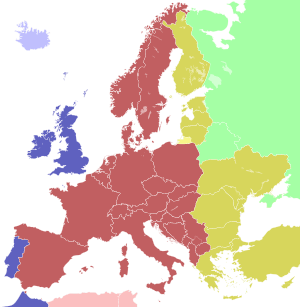Time in Germany

The time zone in Germany is Central European Time (Mitteleuropäische Zeit, MEZ; UTC+01:00) and Central European Summer Time (Mitteleuropäische Sommerzeit, MESZ; UTC+02:00). Daylight saving time is observed from the last Sunday in March (02:00 CET) to the last Sunday in October (03:00 CEST). The doubled hour during the switch back to standard time is named 2A (02:00 to 03:00 CEST) and 2B (02:00 to 03:00 CET).
IANA time zone database
The IANA time zone database contains one zone for Germany, "Europe/Berlin", although in 1945, the Trizone did not follow Berlin's switch to midsummer time.
Additionally, Germany has been politically divided into East Germany and West Germany even after the start of the unix epoch, which is the date from which on the tz database wants to record correct information. The database aims to include at least one zone for every ISO 3166-1 alpha-2 country code, and because this list was first issued in 1997 and thus after the reunification of Germany in 1990, only the unified Germany is listed.[1]
History
Daylight saving time was first introduced during World War I by the German Empire in the years 1916 to 1918. After the end of the war and the proclamation of the Weimar Republic in November 1918, daylight saving time ceased to be observed in peace time. It was then introduced and abolished several times. In 1996, daylight saving time was harmonized throughout the European Union by Directive 2000/84/EC, which moved the end of DST to the last Sunday in October.
In 1980 the exclave Büsingen did not use DST in order to keep to the same time as Switzerland.[2]
See also
- List of time zones
References
- ↑ Lennox, Jonathan (2008-02-11). "Re: FW: FW: Corrections to historic German timezone information". gmane.comp.time.tz.
- ↑ "Schweizer Zeit in Büsingen". Schweizer Fernsehen: SF Videoportal.
External links
- Physikalisch-Technische Bundesanstalt - Legal Time (German)
- Zeitgesetz (Time Act) (German)
- Sommerzeitverordnung (Summer Time Ordinance) (German)
- German Time Act (English)
| ||||||||||||||